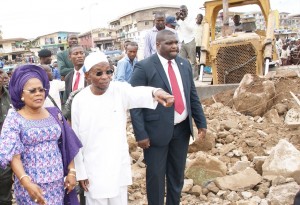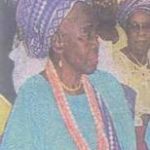
Aregbesola: One Good Turn Deserves Another

When Egyptians decided to rise against their government in 2011, many people took them for jokers. But to them, enough was enough.Muhammad Hosni Mubarak, the president, had ruled the Arab Republic of Egypt for 30 years, from 1981 until he was forced to resign by mass protests on 11 February 2011.Though his administration focused on economic growth and inched toward political reform, any economic gains in the 1990s were offset by criticisms that Egypt was a near-dictatorship. Egyptians took to the streets in what was termed the ‘First Egyptian revolution’ in January 2011 to protest his rule and more than 900 protesters were killed in
February of that year by Mubarak forces. Mubarak was ousted by the people and on 24 June 2012, the election commission announced that Mohamed Morsi had won Egypt’s presidential election, thus becoming the first democratically elected president.
But the Egyptians would soon hit the streets again, this time demanding the removal of Morsi.To the average Egyptian, Mubarak’s rule was even better. The bright future they were looking forward to soon became bleak under Morsi. While opinions are divided over the way the Egyptians have ousted two presidents in succession, the lessons and the results of bad governance are obviously not lost on the rest of Africa and the world at large.
Like Egypt, here in Nigeria, while people have expressed their frustrations at the way the country is being run and the lack of basic amenities, Nigerians, interestingly, still believe things will change for the better.Despite the obvious lack of good leadership in the country, the closest we came to a revolution like Egypt’s was the Occupy Nigeria series of protests that began on Monday, 2 January 2012 in response to the fuel subsidy removal by the government of President Goodluck Jonathan on Sunday, 1 January 2012.
Nigerians, like never before, trooped out in their numbers with one voice to put an end to what was considered an inhuman treatment of Nigerians by government and security agents, as the decision to increase price of fuel was announced on the first day of the year.Good health care delivery, uninterrupted power supply, job opportunities, good roads and security of lives and properties are few of what we ought to enjoy, naturally, as citizens of this great country.
Having lived almost 17 years of my productive life both in the United States and the United Kingdom where things work the way they ought to, many had termed my decision to settle down in Nigeria as unwise and absolutely unnecessary.But, like millions of
Nigerians out there who believe in the Nigerian project, I have not regretted my decision to come back home. After all, I was born and bred here before my sojourn abroad.The Nigerian situation, however, is not all gloom.
In terms of natural and human resources, God has been generous to us as a nation, as we have many talented Nigerians who have distinguished themselves in their various fields while natural resources are scattered all over the country.Our problems, obviously, are that of true leadership and lack of vision. And, while Nigerians have almost lost faith in public office holders and the government in general, there are some whose performances have given us hope to believe more in the Nigerian project. One of such individuals is the governor of Osun State, Mr Rauf Adesoji Aregbesola, whose vision and leadership skills have raised and improved the standard of living in his state.
Though governing Osun cannot be equated to governing Nigeria, Aregbesola, like his Lagos, Edo, Imo and Ekiti counterparts, has given us hope in a better tomorrow.In a nation with 29.7 per cent average in unemployment, Osun is least on the unemployment index with 3 per cent and that speaks volume about his passion for the state. The state has also been adjudged second best of the least poor states by the Federal Bureau of Statistics and that makes Osun the second best managed state in Nigeria. I am most excited at the re-construction of the education system to fit the needs and circumstances of the people; the one that readily comes to mind is the (Opon Imo) tablet of knowledge– a sure way of equipping the students from an early age.With an election around the corner and unlike Egypt where Egyptians revolted against the government, the people of the state can only keep faith with the current administration, hoping that Osun will get better.After all, a good turn, they say, deserves another.
Babayemi writes in from Gbongan, Osun State
ORANMIYAN



